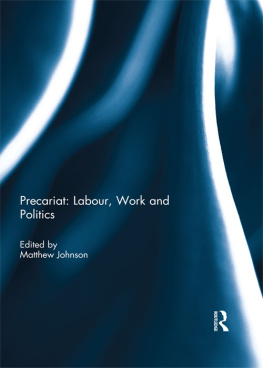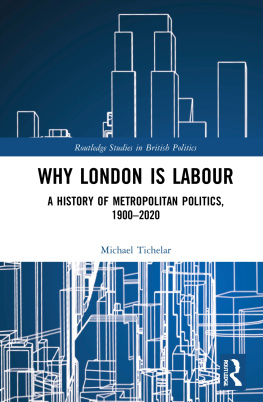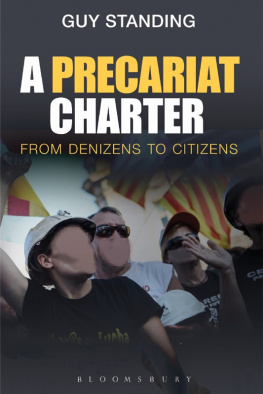Precariat: Labour, Work and Politics
In his recent work, Guy Standing has identified a new class which has emerged from neo-liberal restructuring with, he argues, the revolutionary potential to change the world: the precariat. This, according to Standing, is a class-in-the-making, internally divided into angry and bitter factions consisting of a multitude of insecure people, living bits-and-pieces lives, in and out of short-term jobs, without a narrative of occupational development, including millions of frustrated educated youth , millions of women abused in oppressive labour, growing numbers of criminalised tagged for life, millions being categorised as disabled and migrants in their hundreds of millions around the world. They are denizens; they have a more restricted range of social, cultural, political and economic rights than citizens around them.
This present book explores the nature, shape and context of precariat, evaluating the internal consistency and applications of the concept. Demonstrating the sheer breadth and depth of application, the chapters cover a wide-range of topics, from the relationships between precariat and authoritarianism, multitude (another concept to achieve popular consciousness), and place as well as the nature of precarious identities and subjectivities among those working in immaterial labour. The book concludes with a reply by Standing to reviews of Precariat.
This book was originally published as a special issue of Global Discourse.
Matthew Johnson is a Lecturer and British Academy Postdoctoral Fellow in Politics, Philosophy and Religion at the University of Lancaster. He is interested in the evaluation of culture and the effect of forms of intervention on wellbeing. He has authored Evaluting Culture (Palgrave) and has edited The Legacy of Marxism (Continuum).
Precariat: Labour, Work and Politics
Edited by
Matthew Johnson
First published 2015
by Routledge
2 Park Square, Milton Park, Abingdon, Oxon, OX14 4RN, UK
and by Routledge
711 Third Avenue, New York, NY 10017, USA
Routledge is an imprint of the Taylor & Francis Group, an informa business
2015 Taylor & Francis
All rights reserved. No part of this book may be reprinted or reproduced or utilised in any form or by any electronic, mechanical, or other means, now known or hereafter invented, including photocopying and recording, or in any information storage or retrieval system, without permission in writing from the publishers.
Trademark notice: Product or corporate names may be trademarks or registered trademarks, and are used only for identification and explanation without intent to infringe.
British Library Cataloguing in Publication Data
A catalogue record for this book is available from the British Library
ISBN 13: 978-1-138-80320-6
ePub eISBN 13: 978-1-317-62217-8
Mobipocket/Kindle eISBN 13: 978-1-317-62216-1
Typeset in Times New Roman
by RefineCatch Limited, Bungay, Suffolk
Publishers Note
The publisher accepts responsibility for any inconsistencies that may have arisen during the conversion of this book from journal articles to book chapters, namely the possible inclusion of journal terminology.
Disclaimer
Every effort has been made to contact copyright holders for their permission to reprint material in this book. The publishers would be grateful to hear from any copyright holder who is not here acknowledged and will undertake to rectify any errors or omissions in future editions of this book.
Contents
Matthew Johnson
Bill Jordan
Reply by Daryl Glaser
Ben Trott
Reply by Timothy S. Murphy
Joseph J. Varga
Reply by Angela Wigger
Susan Banki
Reply by Wanda Vrasti
Hanna-Mari Ikonen
Reply by Jeremy Morris
Emiliana Armano and Annalisa Murgia
Reply by Nancy Ettlinger
Mauro Turrini and Federico Chicchi
Reply by Heather McLean
Review
Mark Edward
Review
Stuart Elden
Review
Ian Buchanan
Managing ourselves
Mark Purcell
Review
Catherine Lawlor
Review
Jrg Wiegratz
Review
Jo Grady
Wheres Howard?
Guy Standing
Juliana Bidadanure
The chapters in this book were originally published in Global Discourse, volume 3, issue 34 (SeptemberDecember 2013). When citing this material, please use the original page numbering for each article, as follows:
Chapter 1
Introduction: The precariat
Matthew Johnson
Global Discourse, volume 3, issue 34 (SeptemberDecember 2013) pp. 385387
Chapter 2
Authoritarianism and the precariat
Bill Jordan
Global Discourse, volume 3, issue 34 (SeptemberDecember 2013) pp. 388403
Reply to Bill Jordans Authoritarianism and the precariat
Daryl Glaser
Global Discourse, volume 3, issue 34 (SeptemberDecember 2013) pp. 404405
Chapter 3
From the precariat to the multitude
Ben Trott
Global Discourse, volume 3, issue 34 (SeptemberDecember 2013) pp. 406425
Self-nomination and autonomy: a reply to Ben Trott
Timothy S. Murphy
Global Discourse, volume 3, issue 34 (SeptemberDecember 2013) pp. 426429
Chapter 4
Breaking the heartland: creating the precariat in the US lower rust belt
Joseph J. Varga
Global Discourse, volume 3, issue 34 (SeptemberDecember 2013) pp. 430446
Breaking the heartland: creating the precariat in the US lower rust belt: a response to
Joseph J. Varga
Angela Wigger
Global Discourse, volume 3, issue 34 (SeptemberDecember 2013) pp. 447449
Chapter 5
Precarity of place: a complement to the growing precariat literature
Susan Banki
Global Discourse, volume 3, issue 34 (SeptemberDecember 2013) pp. 450463
Some thoughts on precarity of place: a reply to Banki
Wanda Vrasti
Global Discourse, volume 3, issue 34 (SeptemberDecember 2013) pp. 464466
Chapter 6
Precarious work, entrepreneurial mindset and sense of place: female strategies in insecure labour markets
Hanna-Mari Ikonen
Global Discourse, volume 3, issue 34 (SeptemberDecember 2013) pp. 467481
Precarious work, entrepreneurial mindset and sense of place: female strategies in insecure labour markets: a response to Hanna-Mari Ikonen
Jeremy Morris
Global Discourse, volume 3, issue 34 (SeptemberDecember 2013) pp. 482485
Chapter 7
The precariousnesses of young knowledge workers: a subject-oriented approach
Emiliana Armano and Annalisa Murgia
Global Discourse, volume 3, issue 34 (SeptemberDecember 2013) pp. 486501
The production of precariousness and implications for collective action: a reply to
Emiliana Armano and Annalisa Murgia
Nancy Ettlinger
Global Discourse













